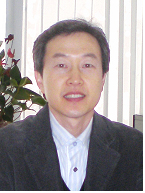research
A KAIST research team led by Prof. Kyoung-Hoon Yang of the Electrical Engineering & Computer Science Department developed a super-fast chip that could lead to huge advancements in broadband Internet technology, the Korean Ministry of Education, Science and Technology said on Thursday (June 26).
The multiplexer chip is the first of its kind to be developed using the quantum effect of resonant tunnelling diode, according to the Ministry.
The integrated circuit chip built at the university laboratory has an operating speed of 45 gigabits per second (Gb/s), while using roughly 75 percent less energy than the previous version. The speed enables the transfer of about 4 full-length movies in one second.
The best operational broadband Internet services provide users with data transfer speed of 40 Gb/s, while most other high-speed online connections offer 10 Gb/s.
"Besides speed, the greatest achievement is low energy use," Prof. Yang said. He stressed that energy use in chips is a crucial factor because power creates heat that can melt circuits and make them inoperable.
"By cutting down on energy use, the new chips can be made smaller and with faster data transfer speed," the scientist said.
He added that efforts are underway to increase operational speed to 100 Gb/s, with energy consumption to be cut to 10 percent of current chips like the high electron mobility transistor, the heterojunction bipolar transistor and the complementary metal oxide semiconductor.
The researcher speculated that such revolutionary chips could be developed in 1-2 years and become the new benchmark in this field since existing chips have limited development capabilities.
The project has received funding from the Education-Science-Technology Ministry since 2000. The Ministry"s financial support will last until 2010.

-
research A Korean research team develops a new clinical candidate for fatty liver disease
A team of Korean researchers have succeeded in developing a new drug candidate for the treatment of non-alcoholic fatty liver disease (NAFLD) acting on peripheral tissues. To date, there has not been an optimal treatment for non-alcoholic steatohepatitis (NASH), and this discovery is expected to set the grounds for the development of new drugs that can safely suppress both liver fat accumulation and liver fibrosis at the same time. A joint research team led by Professor Jin Hee Ahn from Gwang
2024-02-21 -
people Professor Sukyung Park Named Presidential Science and Technology Adviser
Professor Sukyung Park from the Department of Mechanical Engineering was appointed as the science and technology adviser to the President Jae-in Moon on May 4. Professor Park, at the age of 47, became the youngest member of the president’s senior aide team at Chong Wa Dae. A Chong Wa Dae spokesman said on May 4 while announcing the appointment, “Professor Park, a talent with a great deal of policymaking participation in science and technology, will contribute to accelerating th
2020-05-06 -
people Former Minister of Science and Technology Woo Sik Kim Elected as New Chairman of Board of Trustees
Dr. Woo Sik Kim, former Minister of Science and Technology and Deputy Prime Minister, was elected as the new chairman of the KAIST Board of Trustees on March 26. Dr. Kim will succeed Chairman Jang-Mu Lee, whose three-year term expired last month. Dr. Kim is a chemical engineering professor who spent most of his academic career at Yonsei University from 1968. In 2000, he held the office of president of Yonsei University for four years before moving to the Presidential Office of President Roh Moo
2020-04-06 -
research What Fuels a “Domino Effect” in Cancer Drug Resistance?
KAIST researchers have identified mechanisms that relay prior acquired resistance to the first-line chemotherapy to the second-line targeted therapy, fueling a “domino effect” in cancer drug resistance. Their study featured in the February 7 edition of Science Advances suggests a new strategy for improving the second-line setting of cancer treatment for patients who showed resistance to anti-cancer drugs. Resistance to cancer drugs is often managed in the clinic by chemotherap
2020-02-10 -
people Professor Sung Yong Kim Elected as the Chair of PICES MONITOR
< Professor Sung Yong Kim > Professor Sung Yong Kim from the Department of Mechanical Engineering was elected as the chair of the Technical Committee on Monitoring (MONITOR) of the North Pacific Marine Science Organization (PICES). PICES is an intergovernmental marine science organization that was established in 1992 through a collaboration between six North Pacific nations including South Korea, Russia, the United States, Japan, China, and Canada to exchange and discuss research
2019-12-22